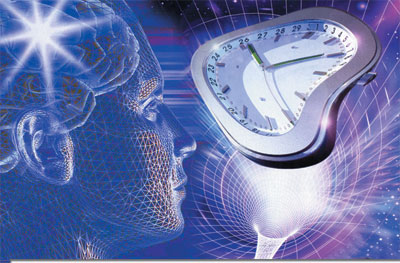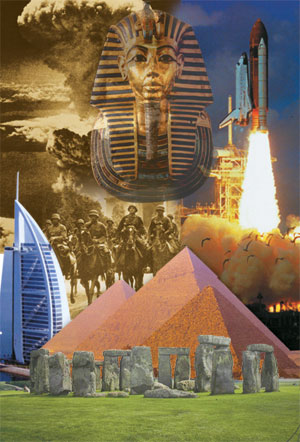The historical and archaeological finds we have examined in this book show that Darwinian claims about the evolution of history and societies are nonsense, with no scientific validity. The only reason why they are upheld is concern about the demise of materialism. As we know, materialists make the mistake of rejecting the truth of creation; believing that matter is the one absolute entity that has existed forever and will continue to exist eternally. In other words, they have divinized matter. (God is surely beyond that) Today, however, science has reached the point of confirming that the universe came into being from nothing (that is, it was created), which has invalidated all theories and philosophies supporting materialism and materialist views.
However, even if materialists' views conflict with scientific evidence, they cannot at any cost accept that matter is not absolute but created. If they could just step back from their dogmatic prejudice for a moment, they would be able to see the plain truth and free themselves from the spell that materialism has cast on them. To do this, it will be sufficient to put their accustomed view to one side, rid themselves of their ideological bigotry and keep an open mind.
One of the first things they must consider is the real nature of the concept of time, because materialists think that time, along with matter, is absolute. This deception has prevented many of them from seeing the truth. Modern science has proven that time is a derivative of matter and that like matter itself, time was created from nothing. That is, time had a beginning. Also, it became known in last century that time is a relative concept; that it is a kind of changing perception and not something stable and unchanging, as materialists had believed for centuries.
 |
| Time exists as a comparison of various illusions inside the brain. If a person had no memory, his brain could not make such analyses and therefore there could be no conception of time. If people had no memories, they would not think of a period of past time, but experience only the single "moment" they live in. |
What we call "time" is in fact a method by which we compare one moment to another. For example, when a person taps an object, he hears a particular sound. If he taps the same object again, he hears another sound. Believing that there is an interval between the two sounds, he calls this interval "time." Yet when he hears the second noise, the first one he heard is no more than an imagination in his mind, merely a bit of information in his memory. A person formulates his perception of time by comparing the "present" moment with what he holds in memory. If he doesn't make this comparison, he can have no perception of time either.
Renowned physicist Julian Barbour defines time in this way:
Time is nothing but a measure of the changing positions of objects. A pendulum swings, the hands on a clock advance. 82
Briefly, time comes about as a result of comparisons of data stored in the brain. If man had no memory, his brain could not make such interpretations and therefore, he would never form any perceptions of time. One determines himself to be thirty years old, only because he has accumulated information pertaining to those thirty years. If his memory did not exist, then he could not think of any such preceding period and would experience only the single "moment" in which he was living.
Because of suggestions we receive, we think we live in separate divisions of time called past, present and future. However, the only reason we have a concept of "past" (as explained earlier) is that various events have been placed in our memories. For example, we recall the moment we enrolled in primary school and therefore perceive it as an event in the past. However, future events are not in our memories. Therefore, we regard these things we don't yet know about as events that we'll experience in the future. But just as the past has been experienced from our point of view, so has the future. But because these events have not been supplied to our memories, we cannot know them.
Were God to put future events into our memories, then the future would be the past for us. For example, a thirty-year-old person recalls thirty years of memories and events and for this reason, thinks he has a thirty-year past. If future events between the ages of thirty and seventy were to be inserted into this person's memory, then for this thirty- year-old individual, both his thirty years and his "future" between the ages of thirty and seventy would become the past for him. In this situation, both past and future would be present in his memory, and each one would be vivid experiences for him.
Because God has made us perceive events in a definite series, as if time were moving from past to future, He does not inform us of our future or give this information to our memories. The future is not in our memories, but all human pasts and futures are in His eternal memory. This is like observing a human life as if it were already wholly depicted and completed in a movie. Someone who cannot advance the film sees his life as the frames pass, one by one. He is mistaken in thinking that the frames he has not yet seen constitute the future.
 |
| The beginning and the end of World War II, the firing of the first rocket into space, the laying of the first stone in the construction of the Ancient Egyptian pyramids, and the erection of stones weighing tons at Stonehenge all exist in a single moment in the sight of God. |
All these facts apply to history and social life as well. We think of societies and world history as limited within the concepts of time and space. We divide history into periods and look at it in terms of this relative concept of ours.
We rely on our five senses to survive. We perceive only what our senses allow, and we can never succeed in stepping out of the boundaries of our senses. The time and space we live in are similarly perceived. If our brain cannot detect a being through our five senses, we simply say that that being has "disappeared." Accordingly, events, images or sensations stored in our memories still exist for us—that is, they are alive, while those that are forgotten no longer exist. To put it another way, beings and events that are not in our memory become past events for us. They are simply "dead" and non-existent.
Yet, this holds true only for human beings, because only human beings have a limited memory. The memory of God, on the other hand, is superior to everything. It is boundless and eternal, yet one point deserves mention here: The term "the memory of God" is used only for clarification purposes. It is definitely not possible that any comparison or similarity could be drawn between the memory of God and the memory of a human. God is surely the One Who creates everything from nothingness and Who knows everything, down to the last detail.
Because the memory of God is infinite, nothing existing in it ever becomes lost. In other words, no living being created by God ever vanishes. No flower fades, no drink of water finishes, no period comes to an end, and no food is wholly consumed. In its first form as a cloud of dust, the universe is in God's sight; every moment in history exists in His sight as they once were. The stones of Stonehenge are being set in place, the Egyptian pyramids are being constructed, the Sumerians are surveying the stars, Neanderthals eke out their living, the Lascaux cave images are being painted, people live in Catal Huyuk, and World War IIis raging. In the same way, societies that will live thousands of years from now exist in God's sight, even as they are building their civilizations and arranging their lives.
Eternity has begun for a being or an event by the time it is created. For instance, when a flower is created, it is, in reality, destined not to disappear. That it ceases to become a part of one's sensations and is erased from one's memory does not actually mean that it has vanished or died. Its state in the sight of God is what actually matters. Furthermore, all states of this being, from its creation, throughout all moments of its life or death, do exist in the memory of God.
 |
All this knowledge is of utmost importance in human life. And this is definitely not any sort of philosophy or school of thought, but the result of scientific conclusions that are impossible to deny. Most probably, many readers are reflecting on these facts about timelessness and the real nature of time for the first time in their lives.
However, one important thing must be kept in mind: God, in the Qur'an, reveals that "only those who sincerely turn to God" (Qur'an, 50: 8) take heed. In other words, only those who truly seek the guidance of God and strive to appreciate His infinite might and His greatness will heed these explanations and have a full grasp of these facts.
An individual may be influenced by materialism all his life. Because of this influence, he may not have the opportunity to think about these facts with an open mind. But this does not mean he must continue to lead his life in error. Anyone who sees the truth must no longer insist on error, but listen to and obey the moral voice of his conscience. The Qur'an says that every individual must avoid being the kind of person who sees the truth in his conscience but flees from it:
And they repudiated them wrongly and haughtily, in spite of their own certainty about them. See the final fate of the corrupters. (Qur'an, 27:14)
Those who see the truth and acknowledge it, if God wills, will attain salvation in this world and in the Hereafter:
He who brings the truth and he who confirms it—those are the people who guard against evil. (Qur'an, 39:33)
We have variegated it for them so they might pay heed but most people spurn anything else but disbelief. (Qur'an, 25:50)